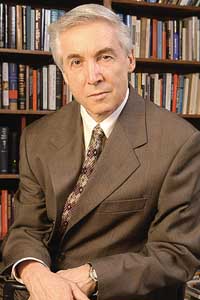Richards’ lecture will explain why some judgments historians make are inevitable
By William HarmsNews Office
 Robert Richards | |
The moral judgments historians write into the narrative histories of their subjects, though troublesome, are also unavoidable, argues Robert Richards, who will present this year’s Nora and Edward Ryerson Lecture at 5:30 p.m. Tuesday, April 12, in the Max Palevsky Cinema in Ida Noyes Hall.
Richards, the Morris Fishbein Professor in the History of Science and Medicine and the College, will discuss the topic “The Narrative Structure of Moral Judgments in History: Evolution and Nazi Biology,” an examination of the work of the 19th-century German scholar Ernst Haeckel.
Haeckel was widely regarded by historians as an intellectual force in Nazism because the theory of the races he developed had been interpreted to justify German superiority. In order to examine that interpretation, Richards will explore how historians use grammatical techniques to construct narratives, such as using different ideas of time and causal structure.
“Since the beginning of the 20th century, historians have been wary of rendering moral judgments about historical figures, believing that such judgments would sully the effort to give an objective account of the past and prevent the construction of scientific history,” he said.
“I will argue such judgments are inevitable, that the deep grammar of narrative history requires that historians make moral judgments about their subjects,” said Richards. Many historians blamed Haeckel, a 19th-century evolutionist, for being the intellectual link between Darwin and Hitler.
The case of Haeckel challenges historians in making their moral judgments because, for one thing, Haeckel died in 1919, before the rise of Hitler. It is impossible to know what he would have thought of the Nazis’ interpretation of his theories, Richards pointed out.
As part of the talk, Richards said he will formulate some principles by which the reflective historian might more properly render evaluative judgments about historical figures.
Richards received a 2004 John Simon Guggenheim Memorial Foundation fellowship to study Haeckel and the debate over evolution in Germany. He has been on leave this year to pursue that work.
He also plans to use his Guggenheim fellowship to write The Tragic Sense of Life: Ernest Haeckel and the Battle Over Evolution in Germany.
Richards, who also has received a grant from the National Science Foundation in support of his research, concentrates on the history and philosophy of biology. He is the author of numerous books, including The Romantic Conception of Life: Science and Philosophy in the Age of Goethe, published in 2002 by the University Press. In this book, he examines the history of science during that era by looking at the many connections between art, philosophy and science.
His other books include The Meaning of Evolution: the Morphological Construction and Ideological Reconstruction of Darwin’s Theory, published in 1992 by the University Press and translated into Spanish in 1998.
Richards also wrote Darwin and the Emergence of Evolutionary Theories of Mind and Behavior, published in 1987. The History of Science Society awarded Richards its 1988 Pfizer Prize for this book.
Richards came to Chicago as a graduate student in 1974, and he joined the faculty after receiving a Ph.D. in the History of Science from the University in 1978.
![[Chronicle]](/images/sidebar_header_oct06.gif)